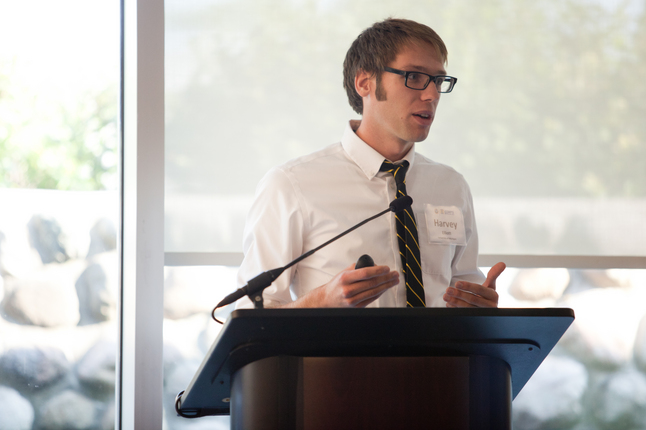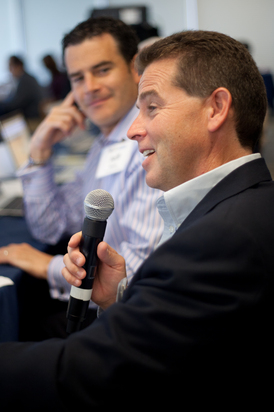Innovation Corps: U-M spinoffs among 27 teams exploring ways to turn research into profit

Harvey Elliott presents on behalf of Electric Field Solutions at the I-Corps closing event at the NCRC
Photo by Laura Rudich courtesy Michigan Engineering
The teams first met in Ann Arbor in July for a three-day intensive training period. They then went back to their respective campuses where they talked to prospective customers and re-worked their business plans, or “canvases,” as they received feedback on their ideas.
“We didn’t really expect to get much out of the process actually,” Angelique Johnson, the entrepreneurial lead for MEMStim, said. “But we found out that we had no idea what the market was looking for.”

Presenters were given feedback by a panel that included U-M center for entrepreneurship director Doug Neal.
Photo by Laura Rudich courtesy Michigan Engineering
“We realized that there was a very lukewarm response to the theory that more electrodes would make a better quality product,” she said.
“So we made a pivot to address a specific need, helping those with hearing loss who had some residual hearing but needed more than a hearing aid.”
The term “pivot” was widely used by teams to describe the process of realization that they went through as they talked to potential partners and customers. During their presentations, which were strictly limited to 20 minutes per team, teams often mentioned that they pivoted on multiple occasions.
In order to have those learning experiences, teams were encouraged to talk to as many outside voices and that interaction was of tremendous benefit for the second U-M team.
“We didn’t know the answers at the start of the program, but we knew that we had some very good ideas,” Harvey Elliott, the entrepreneurial lead for Electric Field Solutions, said.
“Through the program we learned about how to communicate with people on all levels, from the secretary at the door to the CEO in the boardroom.”
Electric Field Solutions, housed in the NCRC’s venture accelerator, is making “wands” that can detect electrostatic build-up. The sensors can be used to prevent electrostatic shocks that cause explosions in plants with flammable materials and can damage sensitive electronics.
EFS is further along than many of the other teams in the program and Elliott, a Ph.D student in engineering, said they hope to have a commercial unit ready within the next three months. By their current plans they will be making money by 2014.
Teams participating in the program are made up of a primary investigator, usually a professor at the University, an entrepreneurial lead, typically a Ph.D. or post-doctoral student, and a business mentor. The program currently is being run at Stanford, Georgia Tech, and U-M. In addition to the two teams that participated in the U-M program, three more teams based at Michigan participated in the inaugural corps at Ga. Tech.
The next I-Corps cohort at Michigan will begin their training on Oct. 9.
Here's a video from U-M about how the I-Corps program will help academics:
Ben Freed covers business for AnnArbor.com. Reach him at 734-623-2528 or email him at benfreed@annarbor.com. Follow him on twitter @BFreedinA2


Comments
xmo
Fri, Aug 31, 2012 : 2:01 p.m.
Its about time! AA SPARK has been doing this for years, The MEDC picked this up and Finally U of M.
Lolly
Fri, Aug 31, 2012 : 12:43 p.m.
Very impressive. Go Blue.